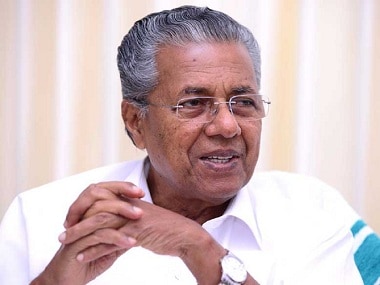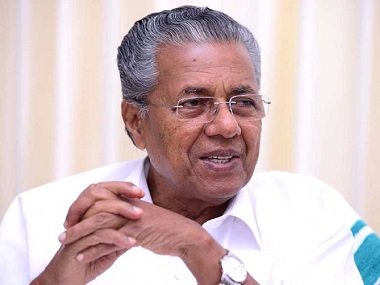Kerala was the third state in the pecking order of states bilking revenue from petroleum products. Its chief minister Pinarayi Vijayan has, however, had the sensitivity and political acumen to announce a Re 1 per liter cut on both petrol and diesel come 1 June 2018. The move according to the chief minister will entail an annual loss of Rs 509 crore . [caption id=“attachment_4350569” align=“alignleft” width=“380”]  A file image of Kerala chief minister Pinarayi Vijayan. News18.[/caption] The Kerala chief minister, announcing the fuel price cut, dared the BJP-ruled states to follow in his footsteps. This is no exercise in tokenism or one-upmanship but a heightened sensitivity for the plight of the common man. It is also wrong to fob off the exercise as a communist’s mindless financial stunt. While Vijayan has sent out a political message wrapped in an economic message to the BJP, the message he himself must imbibe is to look for alternative sources of finances, like a higher revenue from tourism that the state is famous for or revenue from the toddy it produces in abundance. BJP-ruled Maharashtra levies a 46.52 per cent VAT (47.64 per cent in Mumbai) on petrol, the highest in the country. Moreover, a surcharge of Rs 11 per liter and Rs 2 per liter is already collected on petrol and diesel, besides the VAT. It did reduce fuel prices by Rs 2 last October on the directive of the central government, entailing a loss of Rs 2600 crore on an annualised basis, but that hardly scratches the surface of the problem. The BJP may nevertheless bristle with some justification and indignation at the barbs thrown at it by the Kerala chief minister. It could say it cut prices much before Kerala did. But then each fresh crisis calls for a fresh initiative, especially when a volatile commodity like petroleum is involved. It certainly cannot be beyond the ingenuity of the central government to rein in ballooning oil prices with deft handling of its indirect taxation policy. And it cannot be beyond the ingenuity of the BJP-ruled states to think in terms of sources of revenue away from the sitting duck i.e. petroleum products. India Today ran a headline in its 9 PM program on 30 May 2018 titled the ‘cost of price cut’, quoting finance ministry sources – every Rs 2 cut would entail a Rs 28,000 crore loss to the state and center exchequer and would aggravate the fiscal deficit by 0.1 percent of the GDP. Let these ball park figures guide the policy wonks. Indeed petroleum products became the favourite whipping boy of finance ministers both at the center and the states after GST, which, despite its avowedly revenue-neutral rates, did strip them of some of their revenue. But then it was wrong especially on the part of the BJP to give with one hand and take it away with another. GST has the potential to bring down prices in the medium-term thanks to its break from the invidious practice of imposing a tax on tax. Therefore it was and is a boon to the consumers. But it is cruel to fleece them, albeit as a compensatory measure, by hiking petroleum taxes that are not in the GST net as yet. In an election year, spiralling fuel prices can be dangerous to the fortunes of the ruling party which in any case faces anti-incumbency. Fuel price hikes have a contagion effect and could set off uncontrolled increases in the prices of vegetables, milk and other commodities. Prime Minister Narendra Modi enjoys challenges and repartees. He must dare the Kerala CM in return. He must ask his Finance Minister to convene the GST Council meeting where the only item on agenda would be bringing petroleum products into the GST net. Since it takes decisions unanimously and does not thrust the governmental viewpoint on even the lone dissenting state finance minister, the obstructer and obfuscator would be there for everyone to see. GST would end the whimsical hike in state VAT on fuel because it is a ‘one nation one tax.’ When Modi steps out to campaign for the 2019 general election, he must remember that the electorate regards inflation with as much alarm as it does corruption. Today’s bypoll results show that people are angry with the Modi government’s inability to douse the fuel fire.
After it cut fuel prices, the Kerala government could tap both tourism and toddy to shore up its kitty.
Advertisement
End of Article


)

)
)
)
)
)
)
)
)



